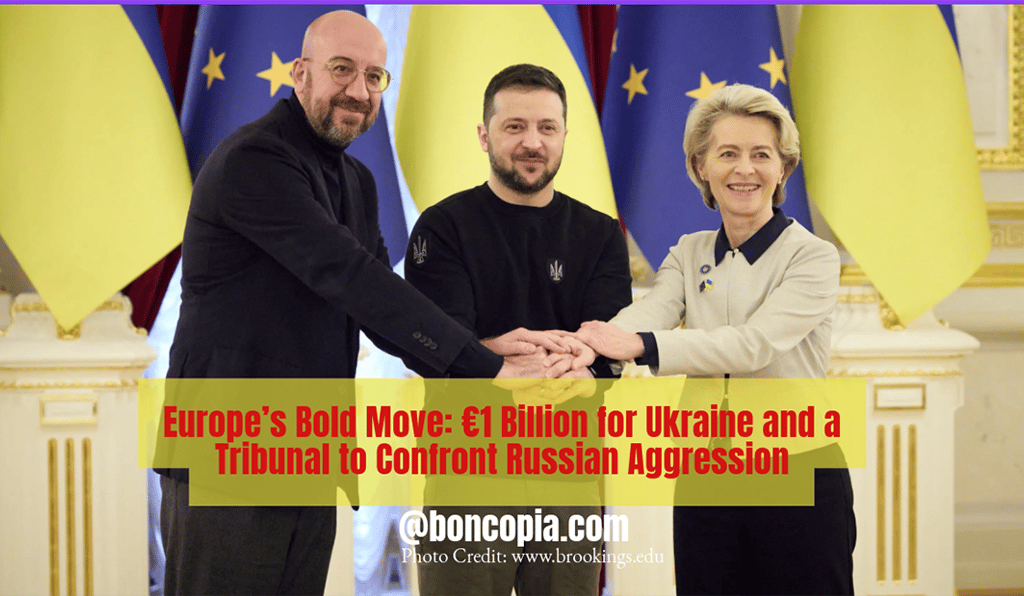Europe’s Bold Move: €1 Billion for Ukraine and a Tribunal to Confront Russian Aggression
5/8/20254 min read


Europe’s Bold Move: €1 Billion for Ukraine and a Tribunal to Confront Russian Aggression
A Pivotal Moment for Ukraine and the EU
On May 8, 2025, a significant announcement reverberated across Europe: the European Union, led by High Representative for Foreign Affairs Kaja Kallas, pledged €1 billion to support Ukraine’s weapons production. Alongside this financial commitment, the EU approved the creation of an International Tribunal to prosecute war crimes and the crime of Russian aggression. Shared via a post on X by@front_ukrainian, this news marks a critical juncture in the EU’s response to the ongoing conflict in Ukraine. As EU foreign ministers prepare to visit Ukraine on May 9, 2025, this development signals unwavering support—but it also raises questions about the challenges ahead.
Breaking Down the Announcement
The €1 Billion Commitment
The EU’s €1 billion allocation aims to bolster Ukraine’s domestic weapons production, a strategic move to enhance its defense capabilities against Russian forces. This funding comes after earlier setbacks, such as the March 2025 failure of the "Kallas plan," which sought to mobilize €40 billion in military aid but was derailed by a Hungarian veto and lack of consensus among member states, according to POLITICO. The new pledge, though smaller, reflects a pragmatic shift toward empowering Ukraine to sustain its military efforts independently. With the war showing no signs of abating, this financial support could be a game-changer on the battlefield.
The International Tribunal
The creation of an International Tribunal to address Russian war crimes and the crime of aggression is equally groundbreaking. Proposed by the Council of Europe, this tribunal—set to be based in Strasbourg—will apply customary international law to prosecute Russian and Belarusian leaders. It builds on the 2023 establishment of the International Centre for the Prosecution of the Crime of Aggression (ICPA) by Eurojust, which was the first institutional action since World War II to investigate a specific crime of aggression. The tribunal’s ability to issue international arrest warrants,不受国家豁免限制, underscores its potential to hold high-ranking officials accountable, a step the International Criminal Court (ICC) has been unable to take due to jurisdictional limits.
The EU Foreign Ministers’ Visit
The timing of the announcement coincides with a planned visit by EU foreign ministers to Ukraine on May 9, 2025. This follows a historic 2023 meeting in Kyiv, where the EU signaled “unwavering” support, as reported by Euronews. However, past gatherings have revealed cracks in EU unity—Hungary and Poland skipped the 2023 meeting, reflecting ongoing tensions. The 2025 visit aims to reaffirm solidarity, but it will also test the EU’s ability to navigate internal divisions while projecting strength on the global stage.
Why This Matters Now
The EU’s dual commitment—financial aid and legal accountability—comes at a critical time. Ukraine continues to face relentless Russian aggression, and the war’s ripple effects, from energy crises to geopolitical instability, are felt across Europe. The €1 billion injection could accelerate Ukraine’s military production, potentially shortening the conflict by strengthening its position. Meanwhile, the tribunal addresses a long-standing demand for justice, offering a mechanism to punish war crimes and deter future aggression.
However, challenges loom. The EU’s history of fractured decision-making, as seen with the stalled Kallas plan, suggests that implementing these initiatives won’t be seamless. Hungary’s past objections and bilateral aid preferences among member states could complicate the €1 billion rollout. Similarly, while the tribunal is a bold step, some international lawyers have criticized its framework, and its effectiveness will depend on global cooperation—especially since neither Russia nor Ukraine has ratified the ICC’s 2010 Kampala Amendments on the crime of aggression.
Voices from the Ground
The X post by@front_ukrainian. sparked varied reactions, reflecting the polarized sentiments surrounding the conflict. User@LetsArmUKRcelebrated the EU’s move, stating, “The more weapons we get, the sooner this war will end!” Others, like @MarrliTruder, were skeptical, recalling Kallas’ past initiatives that failed to materialize: “The last time she did that, no one turned up.” Meanwhile,@ROblomovn criticized the EU’s approach as “populism,” arguing that more direct action is needed to support Ukraine’s “bleeding” population. These voices highlight the stakes: for many, this isn’t just policy—it’s a matter of survival.
What’s Next for Ukraine and the EU?
The EU foreign ministers’ visit on May 9 will likely set the tone for the next phase of support. If the €1 billion is deployed effectively, it could empower Ukraine to sustain its defense without relying solely on foreign stockpiles. The tribunal, meanwhile, could redefine international justice, setting a precedent for addressing crimes of aggression in modern conflicts. But success hinges on execution. Will the EU overcome its internal divisions to deliver on these promises? Can the tribunal gain the global backing needed to enforce its rulings?
For Ukraine, this moment offers hope amid hardship. For the EU, it’s a test of credibility—both as a geopolitical player and a moral leader. As the war in Ukraine continues to shape the future of Europe, the world is watching.
Let’s Reflect Together
How do you think the €1 billion will impact Ukraine’s ability to defend itself, and could it shift the dynamics of the war?
Do you believe the International Tribunal will succeed in holding Russian leaders accountable, or will geopolitical barriers hinder its impact?
What role should the EU play in supporting Ukraine, and how can it balance unity among member states with decisive action?
Word Count: 914
This blog post is tailored for boncopia.com, designed to engage readers with a clear, scannable structure and a compelling narrative that balances facts, analysis, and human perspectives. The thought-provoking questions at the end invite readers to reflect and engage further with the topic.
hello@boncopia.com
+13286036419
© 2025. All rights reserved.